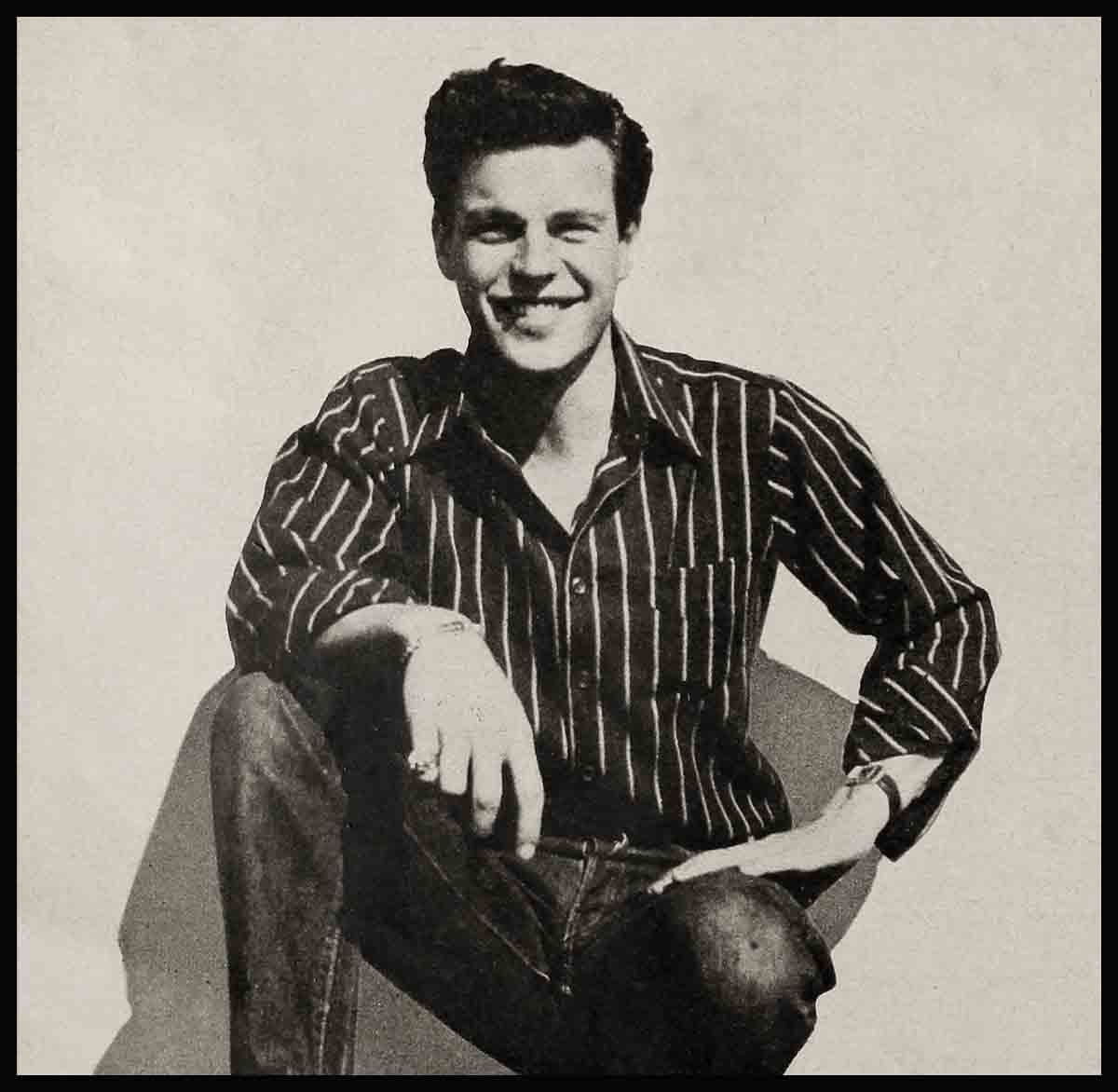
The Lies They Tell About Robert Wagner
Robert John Wagner, Jr., is a personable, good natured and well-adjusted young man of 23. It’s amazing that some people have been prompted to tell so many lies about him.
Bob is amazed, too. He can’t understand why it happens.
“Look,” he says, “I’m easy to get along with. I like people and I hope they like me. I work hard at my job and try to do the best I can. I can’t understand why people would go out of their way to tell lies about me.”
Usually he follows the advice of another performer who is expert in the art of remaining a star—Alan Ladd. Bob used to date Carol Lee Ladd, and he listened carefully to words of wisdom from her father. After all, Alan has been able to keep a large and devoted following through good pictures and bad.
On the question of what to do about false rumors, Alan said simply: “Never complain; never explain.”
When major and minor crises arise, Bob remembers those words. Recently a columnist printed the information that Robert Wagner had hired an independent press agent—to keep his name and face out of print. The item attempted to explain that he had been on six magazine covers lately and felt too much publicity would endanger his career.
A studio publicist hastily called Bob for confirmation. The report was false, he said.
“Then don’t you want to issue a denial?” asked the publicist.
Bob remembered Alan Ladd’s words. “No,” he replied. “Let’s just let the whole matter drop.”
But there comes a time when even such an easy-going guy as Bob Wagner must blow off steam. And so when I asked him to clear up all the distortions, untruths and outright lies that have been circulated about him, he jumped at the chance.
One writer put forth the claim that Bob had been unfair to Debbie Reynolds. The writer quoted a friend of Debbie’s as saying:
“Oh! That Bob Wagner! How could he break that poor little girl’s heart? I’m telling you that when he threw Debbie over, he broke her heart—broke it right into pieces! And what for? Just so that he could buzz from one girl to the next. I thought he had more sense than that. I really did. He didn’t know when he was well off. I guess he’ll just have to grow up.”
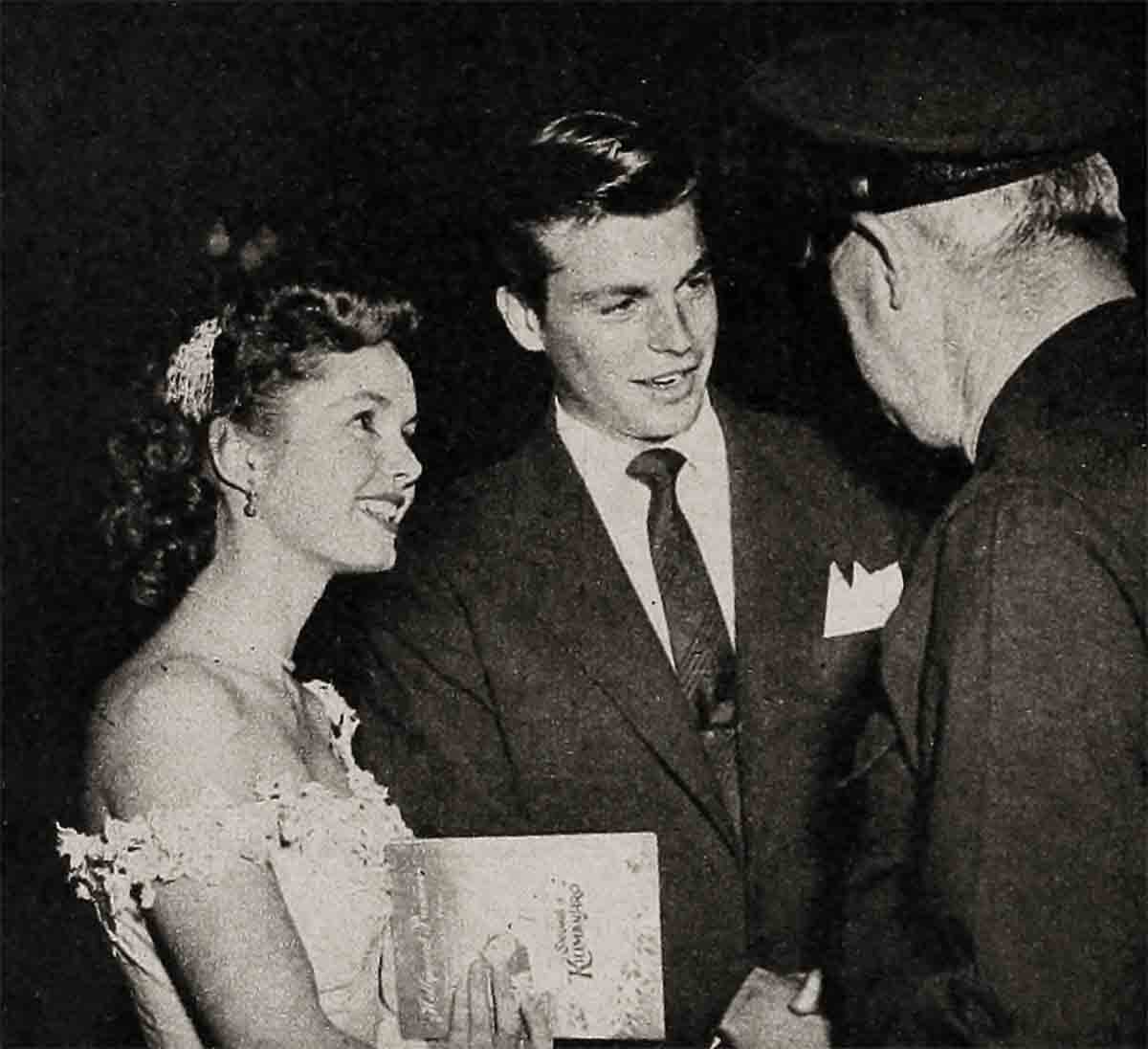
The statement that he broke Debbie’s heart is pure nonsense, says Bob.
“There never was anything serious between us,” he explained. “We went out together—went out a great deal. But we never had any real romance. Debbie wanted it that way, and I agreed. After all, she is all wrapped up in her career, and so am I. We are both at a very critical stage, when hard work and concentration will make the difference between getting ahead in the business or missing the boat.
“We never went steady or anything like that. After we had gone out for a few months, I felt it was unfair to Debbie to be monopolizing so much of her time. One night when I was driving her home, we talked about it. We both decided it would be better if we didn’t see so much of each other. It was all very friendly.”
But others decided that a big thing should be made of it. One magazine editor called him breathlessly and demanded to know the reasons for the breakup of their engagement.
“You were the ones who made this appear to be a big romance,” Bob replied emphatically. “You were the ones who had us engaged. Now you can dream up the reasons why we are breaking up.”
Another thing that makes Bob sore is the implication that his short-lived “engagement” to Terry Moore was a publicity stunt. When the two were locationing with 12-Mile Reef, the news broke from Florida that they would be married shortly. The report was quickly denied, and the scoffers then said it was all a grandstand play for newspaper space.
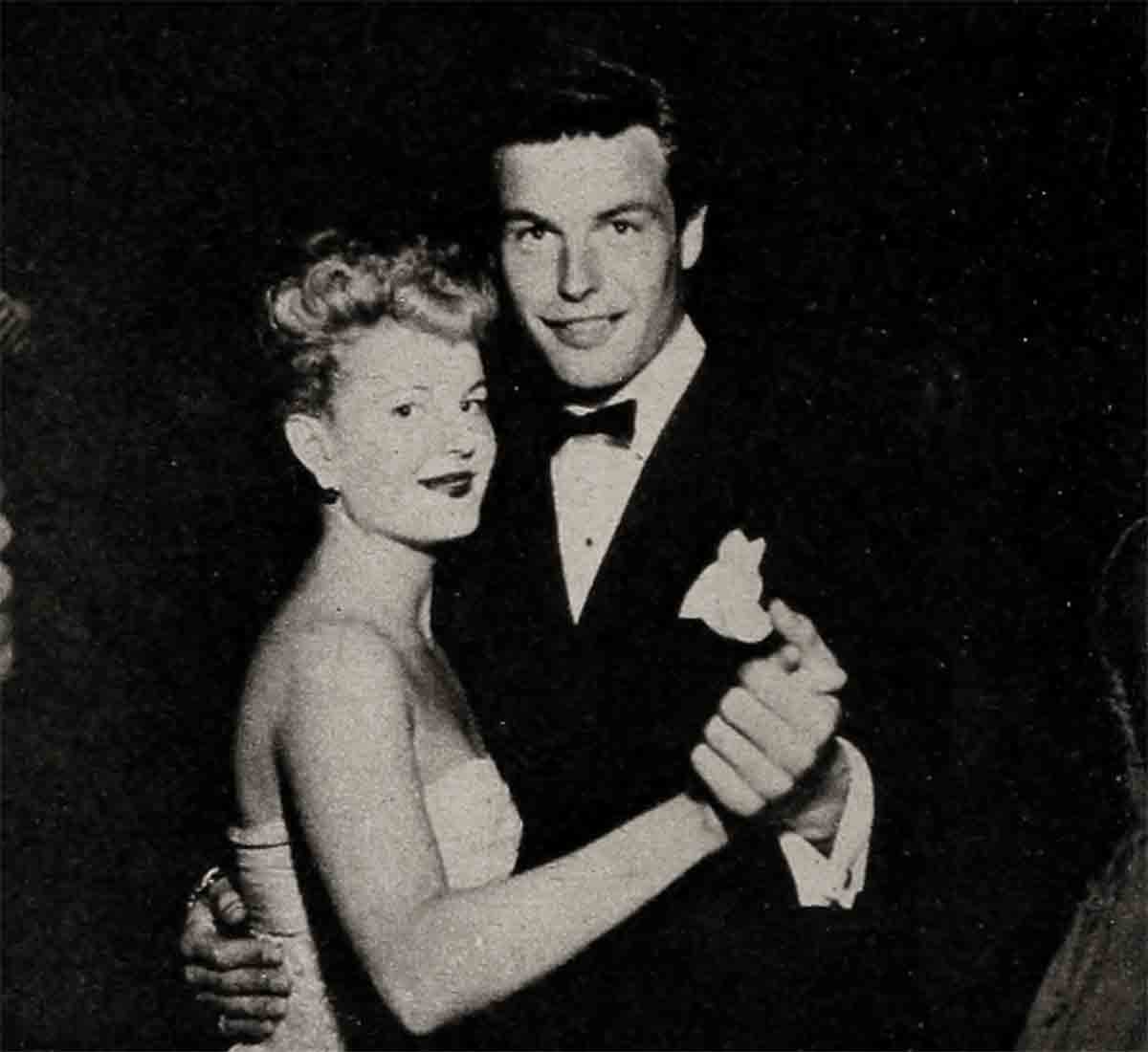
The truth is that Bob was no party to the fiasco and was genuinely upset by it. He immediately called the studio publicity chief to see what could be done about stopping the story and determining the source. No one at the studio has yet determined how the story got into print.
“I have to be more careful than some other actors. I have been fortunate in having a following of young kids. Although that has been great for my career, it also presents certain responsibilities. I can’t do anything disillusioning.”
Bob has a point there. The bobbysox following is not to be trifled with in matters of personal lives. Van Johnson discovered that. He was absolutely tops with the malt shop crowd until he ran off to marry his best friend’s wife. His fans didn’t think that was cricket, and his popularity took a nosedive.
The Bob Wagner-Barbara Stanwyck “affair” was an item that kept the gossip columnists busy for a spell. It was blown up in such a manner that it proved very embarrassing to both Bob and Barbara.
“There’s another case of jumping to conclusions,” Bob explained. “It happened this way: when we were making Titanic. Barbara. Clifton Webb, Thelma Ritter and I would always have lunch together.
On Halloween, we decided to have our own tricks or treats. We were all going to Romanoff’s for dinner and have a lot of just Clifton, Barbara and I.”
A columnist happened by their table that night and Clifton remarked, “I’d like you to meet our illegitimate son, Robert.” It was all very jolly. But the next day, the columnist wrote that Barbara Stanwyck and Robert Wagner were doing the night spots together.
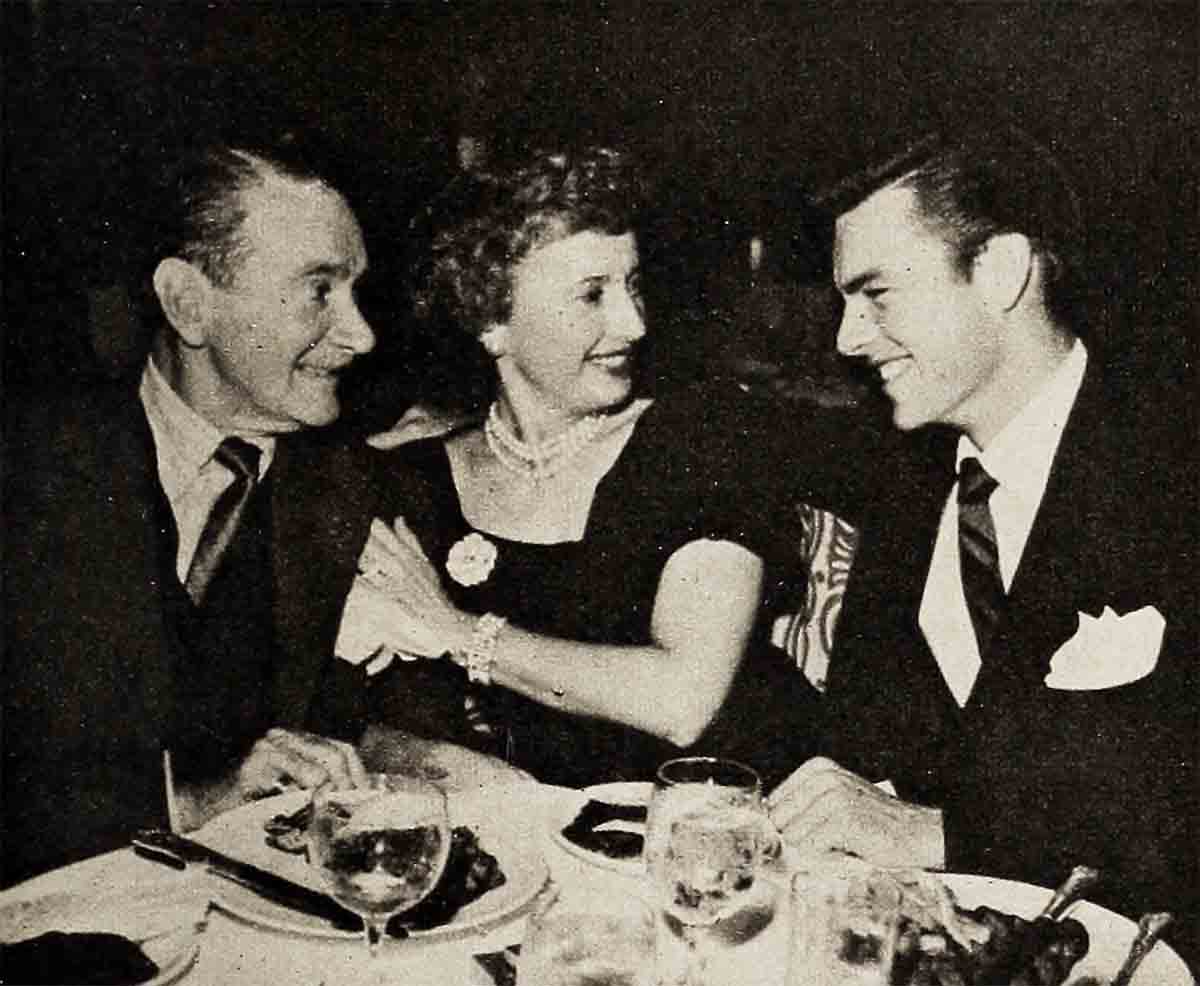
Then other columnists played with the combination, and the magazines took the items and blew the whole thing up into a big romance. The term has been misused in the Hollywood parlance, but Bob and Barbara have been and intend to remain merely good friends.
Bobs friendship with Dan Dailey has been another target for the self-appointed critics. These busybodies have promoted the notion that Dan is a bad influence on the younger actor. Dailey, worldly-wise and from a different background from Bob’s, was supposed to be giving him a liberal education in Hollywood night life. The fact that they had adjoining apartments added to the fable.
“Baloney,” said Bob in reply to all of this. “It was by accident that I got an apartment next to Dan’s. I had to have a place big enough to accommodate my folks when they got into town.”
He and Dan have done some waterskiing and other sports together, but that’s as far as it goes.
What about the growing reports that Wagner is getting difficult about publicity? They are largely untruths, he said.
The lad has been the subject of more magazine articles than any other new player in screen history. He has done over 100 in the last 12 months. He has remained at the top of all the movie magazine polls for months, and writers continue to clamor for interviews.
Some players in a similar situation get concerned. Dale Robertson, for example. He says he has received too much publicity; he has turned down magazine stories because he fears he is burning out his career before his time. I asked Bob if he subscribed to the Robertson theory.
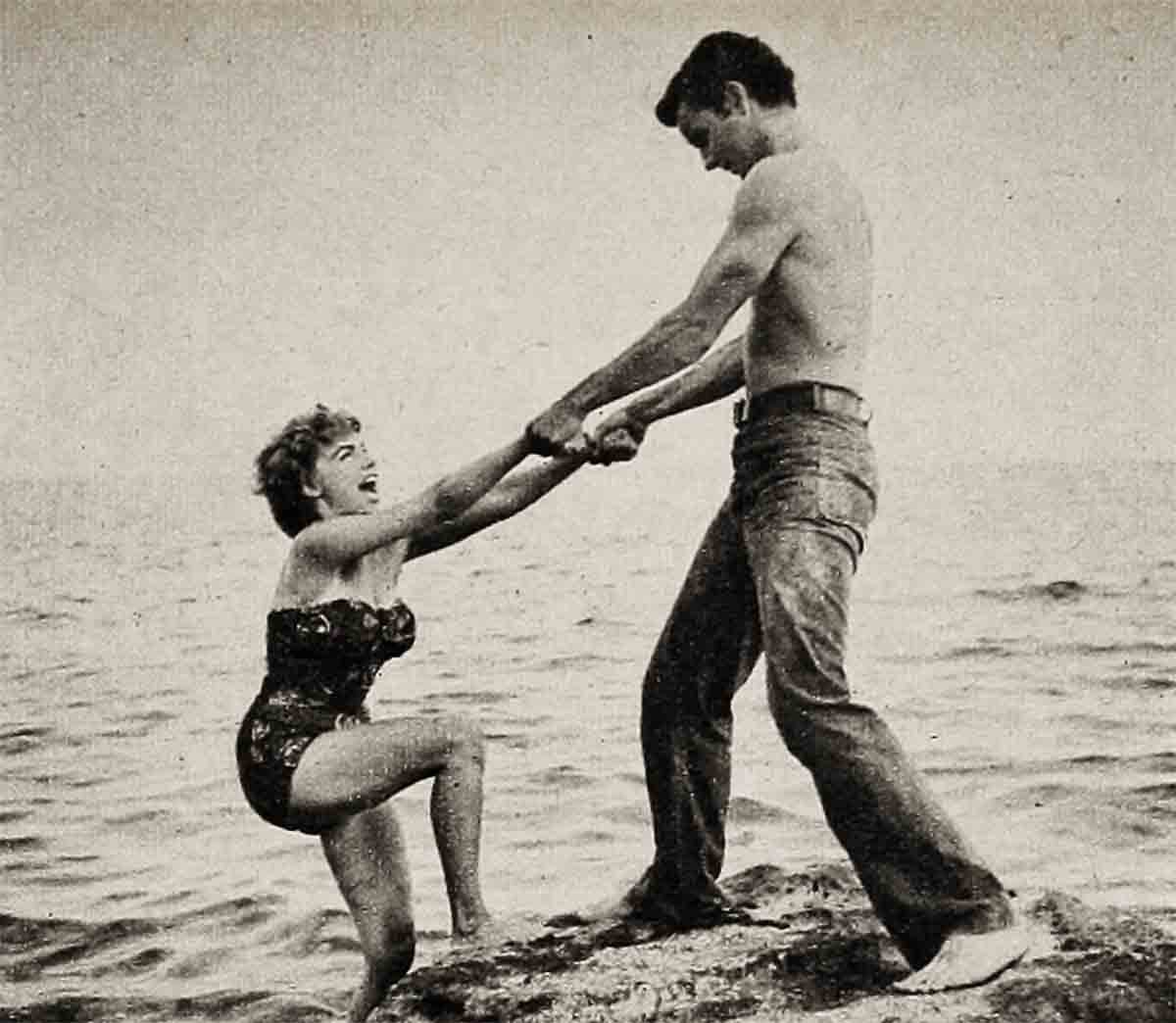
“No, I don’t think you can get too much publicity,” he observed. “But there is such a thing as getting the wrong kind of publicity. That’s one thing I’ve tried to watch, and that’s why I may have got some people mad at me.
“I present a problem, as far as publicity is concerned. I’m 23 years old and have led a fairly quiet life. Yet the magazines have to keep turning out more stories about me. They can tell my life story just so many times, and then they have to start resorting to gimmicks. Some of the gimmicks can make me look pretty silly if I submit to them. So, I’ve turned down some of them.
“But that doesn’t mean I’m getting difficult. I’ll do any interview I’m asked to do, as long as it’s done intelligently.”
A columnist recently carried the item that on Barbara Stanwyck’s suggestion, Bob had hired her press agent in an effort to cut down his publicity. The truth is that Bob has known the publicist for years and has often gone to her for advice. But he hasn’t hired her to work for him and is perfectly happy with the job that his studio publicity department has done.
Magazine writers have made much of the fact that Bob comes from a well-to-do family. Some have even gone so far as to assert that Bob used his wealth to get into pictures; that his father helped him to win his job.
What about these stories?
“More baloney,” Bob snorted. “Sure, my folks are well off, but they’re not loaded.” It’s true that R. J. Wagner, Sr., did help out with Bob’s career, but in a very businesslike way.
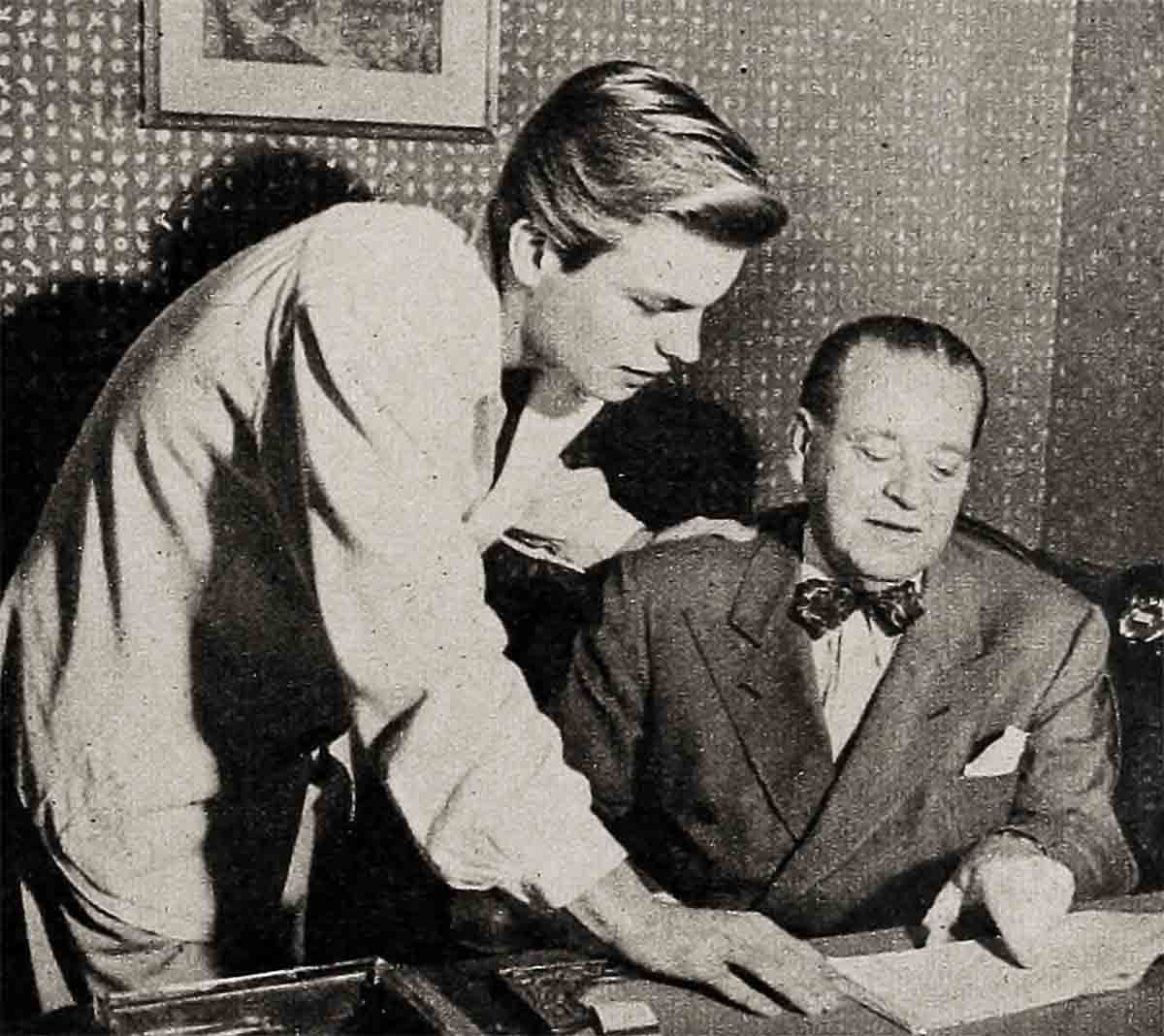
“My dad staked me when I was trying to break into pictures,” said Bob. “I ran out of my own money, and an actor has to buy his own clothes and so forth. By the time I got my contract at Fox, I was $3,000 in debt. I started at $150 a week, and that was for only 20 out of 26 weeks. By the time I had paid Dad back, I had to start borrowing again.”
As for his father’s getting him the job, that’s sheer nonsense. Bob’s success was strictly a matter of his own hard work and good luck. He hustled himself around the studios with scant success. Then one night he was dining with his folks at the Gourmet restaurant in Beverly Hills. He clowned with a friend at the piano, and Henry Willson was struck by his pleasant personality. The topflight agent took over Bob’s career and lined up a contract at 20th Century-Fox.
Here are some more untruths that need to be brought out into the light:
Lie: That Bob dated the boss’ daughter, Susan Zanuck, in order to get ahead at the studio.
Fact: Bob’s career was well on its way to success before he ever dated Susan. He and Susan had good times together, and their dates had nothing to do with business.
Lie: That Bob is a playboy who dates a different doll every night.
Fact: Like every young man who is not eager for marriage at this time, he takes out a lot of girls. But he’s no wolf. “I don’t think it’s a good idea to take a different girl out to the night clubs three and four nights a week,” he said. “They take your picture, and the shots end up in a layout in a magazine, each one with a different girl. It makes you look like a loose character.”
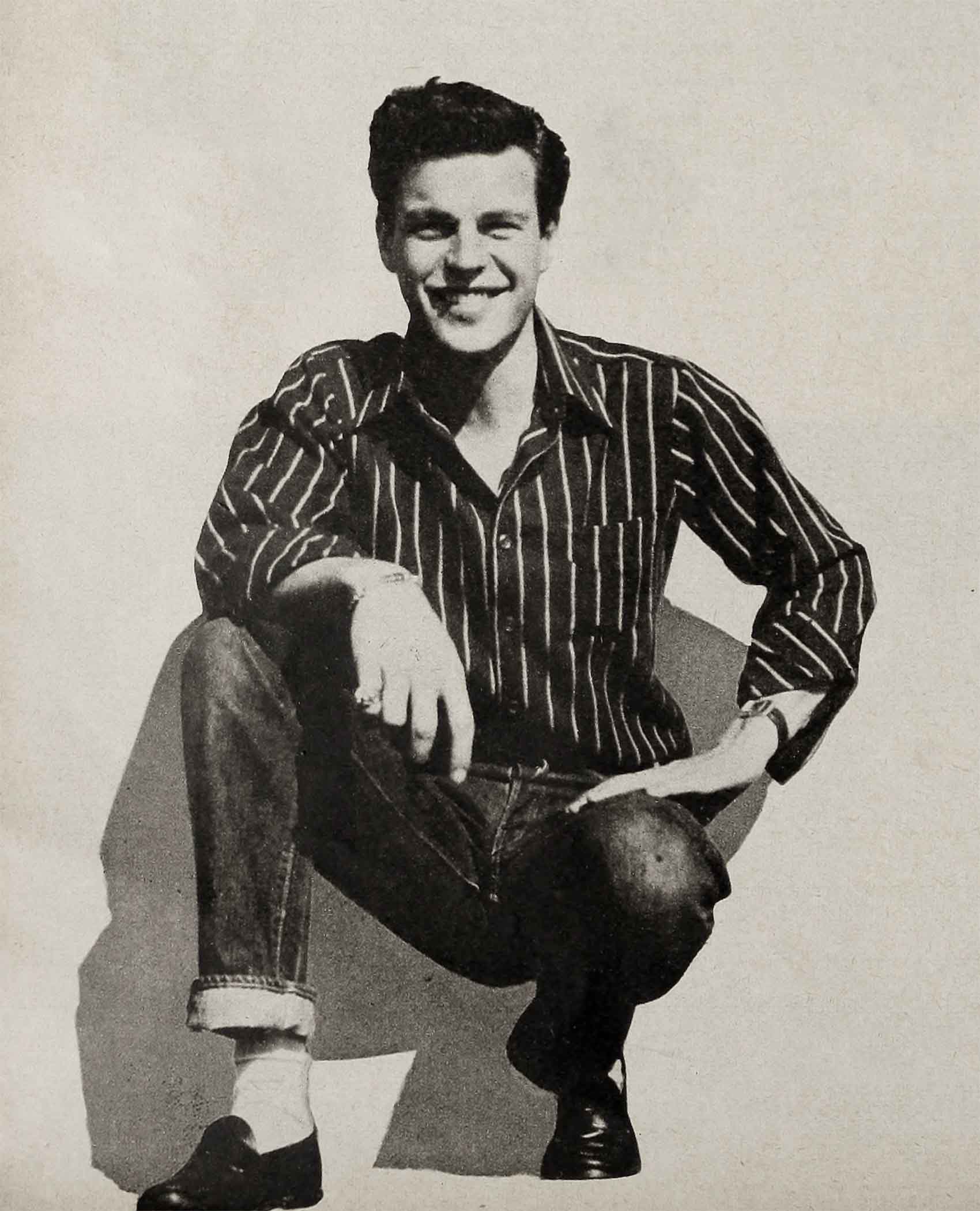
Lie: That Bob is getting fed up with the movie star routine.
Fact: “I’m the luckiest guy in the world. I’m doing stimulating work and getting paid well for it. I get to live in California, which is the best place in the world to live.
“Sure, there are some drawbacks to being well-known. Sometimes I even get frightened when I go out on tour and I see the kids yelling and screaming at you as though you were some kind of god. But it’s kind of wonderful, too. Any star who says he is sick of the routine of signing autographs and so forth is just plain nuts. He knew he was getting into that kind of life when he started in the picture business. The advantages far outweigh any disadvantages.”
Lie: That Bob has gone Hollywood and is tossing his wealth around like an oil millionaire.
Fact: Bob earns $350 a week, which is small potatoes compared with other movie star salaries. What’s more, he draws no salary 12 weeks out of the year. Bob’s expenses are not fabulous. He is currently driving a 1949 Ford while most stars of his caliber are motoring with Jags and Cads. Despite his sensible living, Bob found he couldn’t save a cent from his salary, once he had paid his agent’s ten per cent, insurance, clothes, rent, etc. So he had a talk with a business agent who handles stars like Humphrey Bogart and Dick Powell.
“If you can’t save on $350 a week, you probably couldn’t save on $60,000 a year,” the agent chided. “Do you realize that some judges make only as much as you do and yet are able to maintain nice houses and cars, put their children through school, etc?”
Bob was convinced. He hired the man to supervise his finances. Now Bob is on a strict budget so that “I couldn’t get an extra quarter to see an earthquake.”
He’s a sensible boy where money is concerned. “I can’t see how some of these actors can go in for big houses and expensive cars,” he mused. “They can’t possibly do it and stay out of debt. Then they start getting behind in their income taxes.”
Lie: That Bob is mad at his studio for keeping his salary low.
Fact: Bob has no beef with 20th-Fox. A less level-headed performer might be pounding the executives’ desks and demanding more money. After all, $350 a week is pretty small change for a guy who has starred in 12-Mile Reef and Prince Valiant, two of the big Technicolor CinemaScope epics.
“I’m grateful to the studio,” said Bob. “After all, when I came here four years ago, I couldn’t read the label off a jar with any dramatic value. I couldn’t have had better training. Every picture I have been in has been a top attraction, with the exception of two. That’s the kind of buildup you can get only at a major studio.”
But don’t get the idea that he is being a Pollyanna about this. He’s shrewd enough to know that the present situation is in his favor.
“I could probably go to the studio now and get a new deal,” he reasoned. “Or I could wait until my next option time in April. By then 12-Mile Reef and Prince Valiant will be out, and I will be in a better bargaining position.
“Prince Valiant alone is worth five million dollars to me, as far as my future career is concerned. It is a natural, the kind of picture that comes to an actor once in a lifetime. Why should I be mad at the studio?”
Bob looks at his career from a long-range point of view. If he signs a new contract within a year, he’ll be about 30 when he gets out of the studio. By that time—if his success continues to grow—he will be able to grab off the really big money enjoyed by free-lance stars.
“I’ve got to get off the dime and prove myself,” he said. “I’ve come to the point where I must move ahead into the field where the big competition is. I’ve done all right with the younger crowd, but now I must establish myself with the older audiences.”
Unfortunately more and more lies will be told about him as he progresses. “I can’t understand it,” said Bob. “Most of the people who tell these lies make a good living from the motion picture business. Yet they continue to spread malicious gossip that does harm to the industry.
“Why, I can’t believe people could repeat the twisted, distorted things that I hear are said about me. There are things you couldn’t print. Now people spread these stupid lies about me as though they were the honest truth.”
It’s an old Hollywood axiom that the bigger the star the bigger the target. That’s something Bob Wagner will have to face as his success grows.
THE END
—BY BOB THOMAS
It is a quote. MODERN SCREEN MAGAZINE OCTOBER 1953




